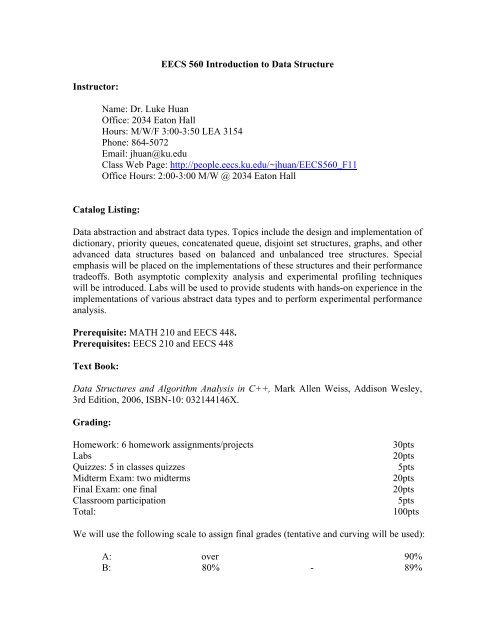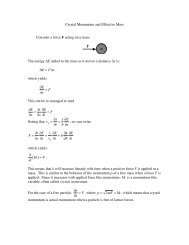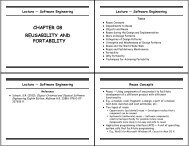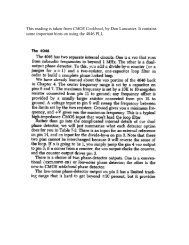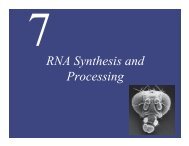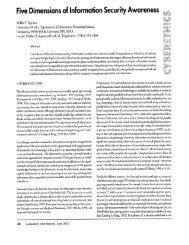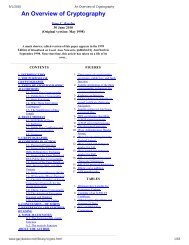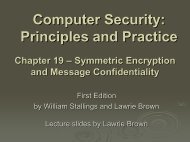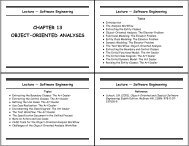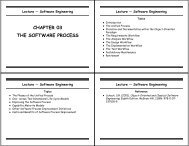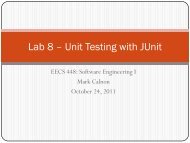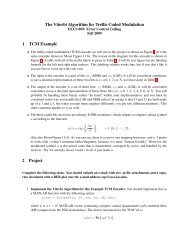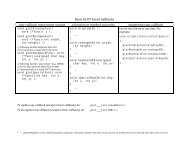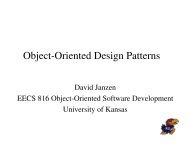EECS 560 Introduction to Data Structure Instructor: Name: Dr. Luke ...
EECS 560 Introduction to Data Structure Instructor: Name: Dr. Luke ...
EECS 560 Introduction to Data Structure Instructor: Name: Dr. Luke ...
Create successful ePaper yourself
Turn your PDF publications into a flip-book with our unique Google optimized e-Paper software.
<strong>EECS</strong> <strong>560</strong> <strong>Introduction</strong> <strong>to</strong> <strong>Data</strong> <strong>Structure</strong>Instruc<strong>to</strong>r:<strong>Name</strong>: <strong>Dr</strong>. <strong>Luke</strong> HuanOffice: 2034 Ea<strong>to</strong>n HallHours: M/W/F 3:00-3:50 LEA 3154Phone: 864-5072Email: jhuan@ku.eduClass Web Page: http://people.eecs.ku.edu/~jhuan/<strong>EECS</strong><strong>560</strong>_F11Office Hours: 2:00-3:00 M/W @ 2034 Ea<strong>to</strong>n HallCatalog Listing:<strong>Data</strong> abstraction and abstract data types. Topics include the design and implementation ofdictionary, priority queues, concatenated queue, disjoint set structures, graphs, and otheradvanced data structures based on balanced and unbalanced tree structures. Specialemphasis will be placed on the implementations of these structures and their performancetradeoffs. Both asymp<strong>to</strong>tic complexity analysis and experimental profiling techniqueswill be introduced. Labs will be used <strong>to</strong> provide students with hands-on experience in theimplementations of various abstract data types and <strong>to</strong> perform experimental performanceanalysis.Prerequisite: MATH 210 and <strong>EECS</strong> 448.Prerequisites: <strong>EECS</strong> 210 and <strong>EECS</strong> 448Text Book:<strong>Data</strong> <strong>Structure</strong>s and Algorithm Analysis in C++, Mark Allen Weiss, Addison Wesley,3rd Edition, 2006, ISBN-10: 032144146X.Grading:Homework: 6 homework assignments/projectsLabsQuizzes: 5 in classes quizzesMidterm Exam: two midtermsFinal Exam: one finalClassroom participationTotal:30pts20pts5pts20pts20pts5pts100ptsWe will use the following scale <strong>to</strong> assign final grades (tentative and curving will be used):A: over 90%B: 80% - 89%
C: 70% - 79%D: 60% - 69%F: below 60%Attendance:I expect you <strong>to</strong> come <strong>to</strong> lectures on a regular basis. While you are in classroom, pleaseshow courtesy <strong>to</strong> your classmate. You are responsible for all announcements made inclass. Generally I will be unwilling <strong>to</strong> answer questions about material covered in a classyou missed (unless you were sick or had another legitimate excuse). Class participation isstrongly encouraged.Late Assignments:There are two types of assignments, written and programming, in this course. Unless youhave a previously approved excuse, the submission of late assignments is stronglydiscouraged. Late penalties: you lose 25% of your scores if the assignment was delayedby one day, 50% for two days, and 75% for three days. No late assignment will beaccepted after three days.Programming Assignments:All programs will be developed in C++ on the departmental linux systems. If you useanother C++ development environment at home or elsewhere, it is your responsibility <strong>to</strong>make sure the code you submit compiles and runs correctly in our linux environment. If itdoes not, your project will not be considered submitted and you will be given no extratime <strong>to</strong> make corrections.It is your responsibility <strong>to</strong> make sure that your program will compile and executecorrectly and we will not debug your program for you. A program that will not compilewill earn you at most 30% of the points.Programming Policy: Each programming assignment that you do not turn in will loweryour final grade by one-half letter. To be considered "turned in", you must earn at least50% of the points on a programming assignment. Note that this means if you turn aproject in late, you must earn more than 50% since point will be deducted from yourscore due <strong>to</strong> lateness.Labs:The purpose of the labs is <strong>to</strong> give you an opportunity <strong>to</strong> implement various conceptscovered in class, thereby learning them more deeply than is possible simply by readingthe book and attending lectures. The labora<strong>to</strong>ry setting allows you <strong>to</strong> ask questions of theGTAs and your fellow students, and pretty much work until the exercises are complete.But completing the labs - just like reading the book and attending lectures – does notguarantee that you have fully mastered the material. It is your responsibility <strong>to</strong> ensure thatyou have fully unders<strong>to</strong>od the lab material as well as the course material on which the lab
is based. Do not fall in<strong>to</strong> the trap of leaning <strong>to</strong>o heavily on help from your classmates.Experience has shown that, while lab grades often average as high as 80-90%, examgrades typically are much lower. Exam averages are typically in the 70s, and scores muchlower are not uncommon. Complete mastery of the material requires both proficiency incoding as well as a thorough understanding of the fundamentals.Homework/project:Unless otherwise stated, all material from (a) the assigned readings, (b) lecture notes, and(c) assignments are fair game for exams.Occasionally you may not understand why points have been deducted from yourassignment or exam. If so, you should come <strong>to</strong> see us. We will reconsider your wholeassignment, or exam, if, and only if, you contact us within 5 days after it has beenreturned in class. No assignment, or exam, will be re-graded after it has been returned formore than 5 days, regardless of whether you were in class that day or not.We are not responsible for any assignment, or exam, that you do not pick up after theyhave been returned in class. Keep all copies of your work. If you dispute any scorerecorded, you must bring in your original work for verification in order <strong>to</strong> have itchanged.Exam PolicyAll exams are closed book, closed notes, and will be held in class. No calcula<strong>to</strong>rs, cellphones, head phones, or electronic devices of any sort will be allowed. No such devicesshould be out in the open.You must write legibly and show all your work clearly for credit. Partial credit will onlybe given <strong>to</strong> meaningful answers. You will be graded according <strong>to</strong> your approach <strong>to</strong> theproblems, mathematical rigor, and quality of your solutions.If you come in late after an exam has already begun, you will not be allowed any extratime <strong>to</strong> complete your exam.Academic Misconduct:The department, school and university have very strict guidelines regarding academicmisconduct. Obviously, copying is not allowed on exams. Students are expected <strong>to</strong>submit their own work on individual programming projects. Lending or borrowing all orpart of a program from another student is not allowed. Students ARE allowed <strong>to</strong> borrowand modify any code on this class web site in their labs or programming projects.Instances of cheating will result in a loss on one letter grade in the course and referral <strong>to</strong>the department chairman and the dean of engineering. If a second case of academicmisconduct is reported in any class, a dismissal hearing may be initiated by the dean ofengineering.


